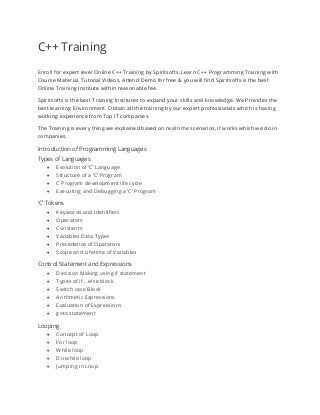C++ Training.pdf
•
0 likes•4 views
Phone:+91 970 442 9989 (WhatsApp Also) Email: info@spiritsofts.com Enroll for expert level Online C++ Training by Spiritsofts, Learn C++ Programming Training with Course Material, Tutorial Videos, Attend Demo for free & you will find Spiritsofts is the best Online Training Institute within reasonable fee. Spiritsofts is the best Training Institutes to expand your skills and knowledge. We Provides the best learning Environment. Obtain all the training by our expert professionals which is having working experience from Top IT companies. The Training is every thing we explained based on real time scenarios, it works which we do in companies.
Report
Share
Report
Share
Download to read offline

Recommended
Recommended
More Related Content
More from SpiritsoftsTraining
More from SpiritsoftsTraining (20)
C++ Training.pdf
- 1. C++ Training Enroll for expert level Online C++ Training by Spiritsofts, Learn C++ Programming Training with Course Material, Tutorial Videos, Attend Demo for free & you will find Spiritsofts is the best Online Training Institute within reasonable fee. Spiritsofts is the best Training Institutes to expand your skills and knowledge. We Provides the best learning Environment. Obtain all the training by our expert professionals which is having working experience from Top IT companies. The Training is every thing we explained based on real time scenarios, it works which we do in companies. Introduction of Programming Languages Types of Languages • Evolution of ‘C’ Language • Structure of a ‘C’ Program • C Program development life cycle • Executing and Debugging a ‘C’ Program ‘C’ Tokens • Keywords and Identifiers • Operators • Constants • Variables Data Types • Precedence of Operators • Scope and Lifetime of Variables Control Statement and Expressions • Decision Making using if statement • Types of if …else block • Switch case Block • Arithmetic Expressions • Evaluation of Expressions • goto statement Looping • Concept of Loop • For loop • While loop • Do while loop • Jumping in Loop
- 2. • break and continue statement Algorithms and Flowchart • Algorithms and Flowcharts (Definitions,Symbols) • Characteristics of an algorithm Arrays and String • Introduction of Array • One – D Array • Two – D Array • Multidimensional Array • Dynamic Arrays • Implementing String Variables • String handling Functions Functions • Concept of Function • User defined Function • System Defined Function • Types of parameter passing in function Pointers • Need of Pointers • Types of Pointers • Pointer Expression • Arrays of Pointers • Pointers and Functions Structure and Unions • Need of Structure • Implementing Structure Variable • Arrays of Structure • Structure within Structure • Introduction of Unions • Difference between Structure and Unions File Handling using ‘C’ • Opening and Closing File • Input / Output operations on File • Random Access to Files • Command Line Arguments Dynamic Memory Allocation • Concept of Dynamic Allocation • Implementing Malloc and Calloc Functions
- 3. • Releasing the free space Storage Classes and Preprocessor • Introduction of Storage Class • Types of Storage Classes • Introduction of Preprocesor • Macro Substitution • File Inclusion Introduction of Data Structure • Concept of Data Structure • Types of Data Structure • Implementing Stack • Implementing Linked List Graphics using C • VDU Basics • Simple library functions Programming in ‘C++’ Introduction to Object Oriented Programming • Concept of OOP • Features of OOP • Introduction of ‘C++’ • Structure of ‘C++’ program • Executing and Debugging a ‘C++’ Program ‘C’ Tokens and Type Casting • Keywords and Identifiers • Operators • Variables • Data Types • Precedence of Operators • Scope and Lifetime of Variables Classes & Objects • Classes & Object specifiers’Classes & Object specifiers • Defining data members and member functions • Array of objects ‘Managing consol I/O • ‘C++’ stream classes • Formatted and unformatted console I/O • Usage of manipulators
- 4. Function in ‘C++’ • Call by reference, Return by reference • Function overloading and default arguments • Inline function • Static class members • Friend functions • Virtual Functions Constructors and Destructor • Concept of Constructor • Types of Constructors • Memory allocation (new and delete) • Usage of destructor Operator Overloading • Overloading Unary and Binary operators • Overloading using friend function Inheritance Types of inheritance • Virtual base classes and abstract base classes • Constructor and destructor in derived class Working with files • File operations • File pointer and their manipulation • File updation with random access Exception Handling • Various Exception Handling classes • Implementing try and catch block • Use of throw keyword Templates • Introduction to Templates • Class templates, function templates and overloading of function templates • Standard Template Library (STL) • Run Time Type Identification (RTTI)